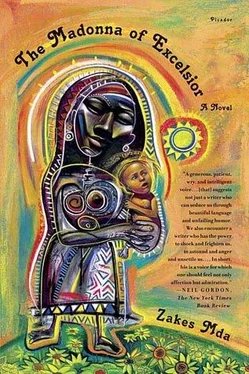Niki had even tried to marry her off. To no one in particular.
“It’s high time you found yourself a good man, Popi,” Niki had said. “You will end up being a lefetwa.”
Popi had laughed at the prospect of ending up an old maid. A lefetwa.
“There are no good men out there, Niki,” she had responded.
“They cannot all be bad. There’s bound to be a good man waiting for your love.”
“Maybe when you are dead, Niki — God forbid — when you are dead, I’ll think of such things.”
“So it is me who is holding you ransom?”
“You are not holding me, Niki. I just want to look after you. I don’t need anyone else when you are there.”
“Rubbish! You are the one who needs looking after.”
Niki had contemplated this exchange for a while, and then she had suddenly blurted out, “It is the Movement, isn’t it? It is the Movement that is making you a lefetwa!”
“It is not the Movement,” Popi had explained patiently. “Yes, I am dedicated to it. But it is not holding me from marriage. Even if I were to marry, that man would have to understand that I am dedicated to the Movement first and foremost. He would have to be a Movement man himself.”
Niki had given up on her with the final mutter that they were trying to take her children away, without really elaborating on the identity of they . They were pillaging her heart for the last nestling that had taken refuge in its corners. Ripping it out without mercy. Leaving only emptiness.
Popi had continued with her campaigns for the Movement.
We had witnessed Popi’s emergence from the battering of two years before without a dent on her willowy body. We had watched her blossom into a woman of exceptional poise, with the dimples of Niki’s maidenhood. Her beauty had even erased the thoughts that used to nag us about her being a boesman. Well, not quite erased them. They had just shifted to the back of our minds. And we did not recall them every time we saw her. Perhaps our eyes were getting used to her. As they were getting used to others like her. Many others. Walking the streets of Excelsior , as the late and lamented Minister of Justice, the Honourable Mr P.C. Pelser, had once put it when he was explaining to his colleagues in Parliament why the police had had to act against the Excelsior 19.
Whenever we saw Popi, we praised her beauty and forgot our old gibes that she was a boesman. We lamented the fact that we never saw her smile. That a permanent frown marred her otherwise beautiful face. That her dimples were wasted without a smile. Perhaps we had forgotten that we had stolen her smiles.
It was sad that she could not see any beauty in herself.
“If only she would take off that turban she always wears like a white Winnie Mandela,” some of us said.
“She will be a model one day. If only she could go to the city. Even to Bloemfontein.”
“You can’t be a model in Bloemfontein. She would have to go to Johannesburg or Cape Town to be a model.”
“Model? Never! Haven’t you seen in the magazines? They don’t have light-skinned African models. You have to be pitch black to be an African model.”
This, of course, was idle talk on our part. Popi had no intention of becoming a model. She had every intention of becoming a politician. Before the general elections the previous year, she had trudged the farmlands on foot, canvassing farm workers to vote for the Movement. She had told the farmers to go to hell when they fired their workers for being cheeky. She had staged fiery confrontations with those farm owners who had sent their workers packing with the message: “Go ask Mandela to give you a job,” or “Go ask Mandela for a raise.” Although the workers had enjoyed these confrontations, their problems were never solved. Until Viliki was called. He would negotiate with the farmers. He would tell them that it was in their interests to maintain good relations with their labour force. Sometimes he would be successful and get the workers their jobs back. But Popi would be the one they would sing songs about.
The workers loved her precisely because she was a hothead. They would exclaim in admiration, “Hey, that boesman gives the Boers hell!” They had become her ardent followers. And therefore ardent followers of the Movement.
Others had even tried their hand at propositioning her. The gift that was her body was a waste if it didn’t have sinewy muscles rubbing against it. Her skills at organising were of no use if she could not organise the warmth of the hearth and of the blankets for the father of her future children.
But these men were crying in a void. She had no plans to become someone’s wife. Or someone’s anything. Her innocence was bliss. At the church gatherings, when other women of her age talked of carnal experiences, she pretended she knew what they were talking about. And proceeded to recruit them to vote for the Movement.
South Africa’s first democratic general elections had come and gone. The Movement had won an overwhelming majority in Parliament and in most of the provinces. In the Free State province, some of the outstanding victories were in the districts where Popi and Viliki had campaigned.
When the local elections were held the following year, the Excelsior branch of the Movement had put both Popi and Viliki’s names on the candidates’ list. There had been murmurs of nepotism from some members. But the view that Popi had earned a place on the candidates’ list in her own right prevailed. She had established a big following among the farm workers, who had voted for the Movement. She had worked very hard, and deserved the honour of representing a ward in Mahlatswetsa Location. Just like the Sisulu family in the National Parliament in Cape Town, one sage observed. The matriarch, Albertina, was a Member of Parliament. So was her daughter, Lindiwe, and also her son, Max. Her husband, Walter, would have been one too if he had chosen to stand. He had paid enough dues even to be President of the country. All of these family members were in Parliament in their own right as leaders who had worked for the Movement over the years, both in exile and inside the country. If there was no nepotism in the case of the Sisulus, then there was no nepotism in the case of Viliki and Popi.
This argument had won the day and Popi’s name had stayed on the list.
Popi revelled in being a Young Lion who breathed fire. But in the council chambers on this first day, she sat timidly. Urine continued to build up pressure in her bladder while Angela van der Walt spoke endlessly about procedure.
The first business of the day was the election of the mayor. Angela van der Walt presided over the election. The National Party nominated Lizette de Vries. The Movement nominated Viliki Pule. The three members of the National Party voted for Lizette de Vries. The six members of the Movement voted for Viliki Pule. Tjaart Cronje abstained. Viliki Pule became the first black mayor of Excelsior.
“Now, Your Worship,” said Angela van der Walt, with a tinge of sarcasm in her voice, “you have to take over the chair.”
She vacated the head of the table, and left the council chamber. Popi jumped up and followed her. In the corridor, she asked the town clerk to show her the toilet.
Chairing meetings was nothing strange to Viliki. He had experience in chairing the branch meetings of the Movement. But the council, as the town clerk had explained, had its own rules and regulations. It had its own procedure, of which Viliki knew very little. Although, of course, the town clerk’s littie lecture had been of great help.
Viliki called the councillors to order, and thanked them for placing this great trust in him. He promised to serve them diligently and faithfully. A member of the Movement moved that the honourable members of the council should discuss the swearing-in ceremony and a big feast for all the people of Excelsior to welcome their new mayor.
Читать дальше












